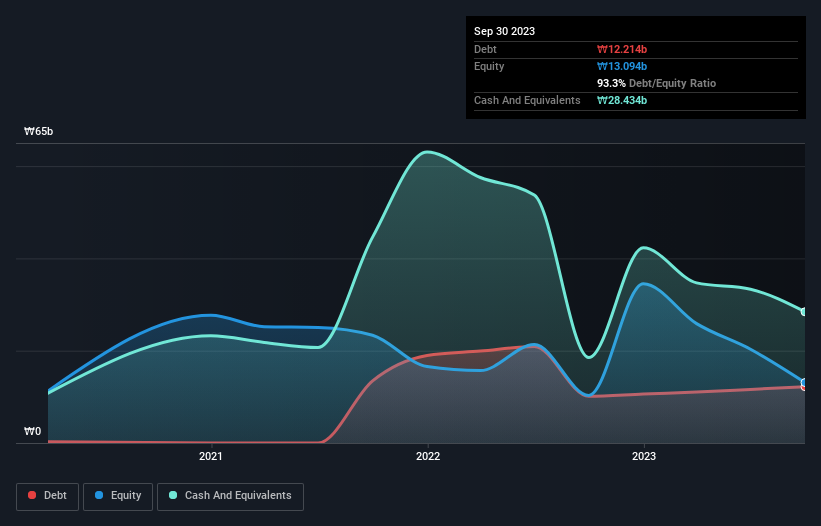The external fund manager backed by Berkshire Hathaway's Charlie Munger, Li Lu, makes no bones about it when he says 'The biggest investment risk is not the volatility of prices, but whether you will suffer a permanent loss of capital.' So it seems the smart money knows that debt - which is usually involved in bankruptcies - is a very important factor, when you assess how risky a company is. Importantly, Alchera Inc. (KOSDAQ:347860) does carry debt. But is this debt a concern to shareholders?
What Risk Does Debt Bring?
Generally speaking, debt only becomes a real problem when a company can't easily pay it off, either by raising capital or with its own cash flow. If things get really bad, the lenders can take control of the business. However, a more frequent (but still costly) occurrence is where a company must issue shares at bargain-basement prices, permanently diluting shareholders, just to shore up its balance sheet. Of course, plenty of companies use debt to fund growth, without any negative consequences. The first step when considering a company's debt levels is to consider its cash and debt together.
View our latest analysis for Alchera
What Is Alchera's Net Debt?
You can click the graphic below for the historical numbers, but it shows that as of September 2023 Alchera had ₩12.2b of debt, an increase on ₩10.1b, over one year. But it also has ₩28.4b in cash to offset that, meaning it has ₩16.2b net cash.

How Healthy Is Alchera's Balance Sheet?
According to the last reported balance sheet, Alchera had liabilities of ₩6.67b due within 12 months, and liabilities of ₩21.2b due beyond 12 months. Offsetting these obligations, it had cash of ₩28.4b as well as receivables valued at ₩1.87b due within 12 months. So it can boast ₩2.43b more liquid assets than total liabilities.
This short term liquidity is a sign that Alchera could probably pay off its debt with ease, as its balance sheet is far from stretched. Simply put, the fact that Alchera has more cash than debt is arguably a good indication that it can manage its debt safely. When analysing debt levels, the balance sheet is the obvious place to start. But it is Alchera's earnings that will influence how the balance sheet holds up in the future. So when considering debt, it's definitely worth looking at the earnings trend. Click here for an interactive snapshot.
In the last year Alchera wasn't profitable at an EBIT level, but managed to grow its revenue by 21%, to ₩12b. With any luck the company will be able to grow its way to profitability.
So How Risky Is Alchera?
We have no doubt that loss making companies are, in general, riskier than profitable ones. And the fact is that over the last twelve months Alchera lost money at the earnings before interest and tax (EBIT) line. Indeed, in that time it burnt through ₩16b of cash and made a loss of ₩28b. But at least it has ₩16.2b on the balance sheet to spend on growth, near-term. Alchera's revenue growth shone bright over the last year, so it may well be in a position to turn a profit in due course. Pre-profit companies are often risky, but they can also offer great rewards. When analysing debt levels, the balance sheet is the obvious place to start. But ultimately, every company can contain risks that exist outside of the balance sheet. For example Alchera has 3 warning signs (and 1 which is a bit concerning) we think you should know about.
When all is said and done, sometimes its easier to focus on companies that don't even need debt. Readers can access a list of growth stocks with zero net debt 100% free, right now.
New: Manage All Your Stock Portfolios in One Place
We've created the ultimate portfolio companion for stock investors, and it's free.
• Connect an unlimited number of Portfolios and see your total in one currency
• Be alerted to new Warning Signs or Risks via email or mobile
• Track the Fair Value of your stocks
Have feedback on this article? Concerned about the content? Get in touch with us directly. Alternatively, email editorial-team (at) simplywallst.com.
This article by Simply Wall St is general in nature. We provide commentary based on historical data and analyst forecasts only using an unbiased methodology and our articles are not intended to be financial advice. It does not constitute a recommendation to buy or sell any stock, and does not take account of your objectives, or your financial situation. We aim to bring you long-term focused analysis driven by fundamental data. Note that our analysis may not factor in the latest price-sensitive company announcements or qualitative material. Simply Wall St has no position in any stocks mentioned.
About KOSDAQ:A347860
Alchera
Engages in the research and development of artificial Intelligence (AI) solutions.
Excellent balance sheet with low risk.
Market Insights
Community Narratives



